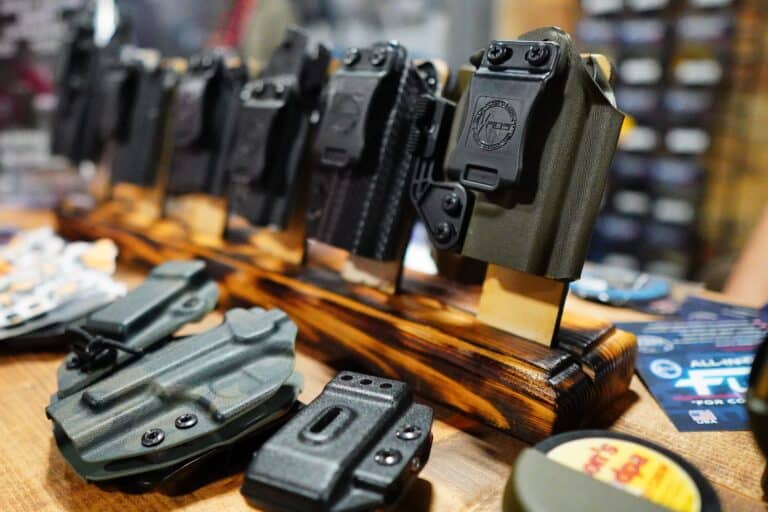Permitless gun-carry advocates hit another milestone this week, but is the movement running out of room to grow?
On Monday, Florida became the 26th state in the country to adopt a policy allowing any adult who would otherwise qualify for a concealed-carry permit to carry a firearm in public without obtaining one first.
“Constitutional Carry is in the books,” Governor Ron DeSantis (R.) said, punctuating the sea change that took place with Florida’s adoption of the policy. Once the law takes effect on July 1, a majority of states will officially allow law-abiding adults to exercise their right to bear arms in public for self-defense without getting government permission beforehand. It will also mean that the second and third most populous states in the country (Texas and Florida, respectively) share that policy.
It’s a momentous victory for gun-rights advocates, who have had astonishing success in getting the policy adopted over the last two decades. Indeed, 24 states went permitless since just 2010.
But with such rapid success, there are bound to be speed bumps along the way. And it’s starting to look like the road ahead is about to get much bumpier for permitless carry advocates. That’s because there simply aren’t a lot of easy pick-ups left.
In the short run, sure, there is still some low-hanging fruit. At least two more states, Nebraska and South Carolina, will likely join Florida in passing permitless carry this year.
Nebraska’s permitless carry bill has already cleared a significant hurdle in the state’s unicameral legislature by receiving approval in two of the three required votes for passage, and the state’s Republican Governor has signaled his willingness to sign the measure into law. South Carolina’s Governor has also come out in favor of a permitless carry bill that has already cleared the state House and is awaiting approval in the state’s Republican-controlled Senate.
In addition to Nebraska and South Carolina, a case could be made for states like Louisiana and North Carolina potentially adopting permitless carry in the short-to-medium term.
The Republican-controlled Louisiana legislature already passed a permitless carry bill with huge majorities back in 2021. That effort was vetoed by Governor John Bel Edwards (D.) and a handful of legislators defected when it came time for a veto-override vote. With a change in the Governor’s seat or a new crop of Republican legislators less prone to flip-flopping, you could easily see Louisiana joining the rest of the Gulf states in going permitless.
The chances are slimmer in North Carolina, considering the political clout the state’s more progressive urban centers still wield. However, gun rights advocates currently have the wind at their backs. After years of failed attempts, Republican lawmakers were finally able to repeal the state’s Jim Crow-era pistol-purchase-permit law by overriding Democratic Governor Roy Cooper’s veto last month.
Furthermore, a party defection by state representative Tricia Cotham this week now gives North Carolina Republicans official supermajorities in both the House and Senate, and there are rumors that other Democratic legislators are considering a similar switch. In theory, that opens the door for gun-rights advocates to press for a permitless carry bill by the end of the next session that Governor Cooper can’t do anything to stop.
Beyond that, however, the path forward for further expansions of permitless carry is a lot murkier. Assuming all the above states do adopt the policy, that would make 30 mostly Republican-dominated states that do not require a permit to carry a concealed firearm. But the remaining 20 states would either be fairly evenly-split purple states or outright deep-blue bastions where a permitless carry bill will not see the light of day.
Pennsylvania’s recent permitless carry gambit highlighted the inherent limits of attempting to get the policy passed in a purple state, and Democrats have since gained more political power there in the ensuing years.
Of course, there’s always the possibility that permitless carry’s evolution from here mirrors that of shall-issue’s march across the country in a previous generation. Following Florida’s catalyzing adoption of shall-issue concealed carry permitting in 1987, chunks of states followed suit in several waves over multiple decades, to the point where all but seven states were willing to allow most lawful adults to carry a gun in public. If it becomes clear over the next few years that permitless carry is not the public safety disaster that its opponents claim it will be, then perhaps it too will see the same course of adoption.
But at the same time, gun politics has become a far more polarizing issue than it was when shall-issue permitting was gaining popularity. There are now fewer pro-gun Democratic constituencies (and, by extension, fewer pro-gun Democratic politicians) than there used to be. That could ultimately preclude permitless carry from sharing the same trajectory as its predecessor.
Based on the current landscape, 30 states may be the near-term cap on permitless carry’s reach–the best its backers can hope for under present-day political realities. Gun-rights supporters in the remaining 20 states will probably have to focus on more immediate goals, like fighting for functioning shall issue regimes and against Bruen pushback bills.






